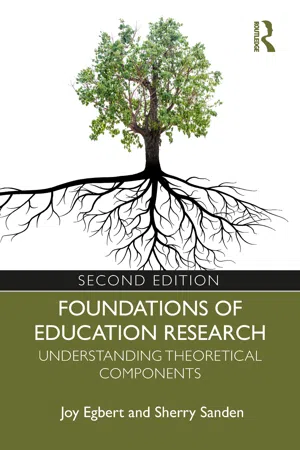
Foundations of Education Research
Understanding Theoretical Components
- 10 pages
- English
- ePUB (mobile friendly)
- Available on iOS & Android
About this book
Now in its second edition, Foundations of Education Research defines, discusses, and offers applications for the central components of educational research, providing both novice and experienced researchers with a common ground from which to work. Fully updated throughout, the second edition adds a glossary of terms, additional examples, and includes a discussion of similarities and differences in education research. Eight concise, accessible chapters cover conceptual framework, epistemology, paradigm, theory, theoretical framework, and methodology/method. This unique primer demystifies jargon and makes the theoretical components of research accessible, giving students the tools they need to understand existing education research literature and to produce theoretically-grounded work of their own.
Each chapter begins with perspectives from both novice and experienced researchers, whose guiding questions assist researchers engaging with theory for the first time and those looking to improve their understanding of the fundamentals. Practice exercises, examples, and suggested reading lists at the end of each chapter offer students resources they can apply to their own research and thinking in concrete ways. A perfect accompaniment to standard research courses, this book is designed to help students achieve a deeper understanding of what is expected of them and ideas about how to achieve it.
Frequently asked questions
- Essential is ideal for learners and professionals who enjoy exploring a wide range of subjects. Access the Essential Library with 800,000+ trusted titles and best-sellers across business, personal growth, and the humanities. Includes unlimited reading time and Standard Read Aloud voice.
- Complete: Perfect for advanced learners and researchers needing full, unrestricted access. Unlock 1.4M+ books across hundreds of subjects, including academic and specialized titles. The Complete Plan also includes advanced features like Premium Read Aloud and Research Assistant.
Please note we cannot support devices running on iOS 13 and Android 7 or earlier. Learn more about using the app.
Information
1
Introduction
- What is positionality?
- Why do we need a discussion of theoretical components of research?
- What are the research components and why are they important?
- How are these components defined?
What Is Positionality?
Why Do We Need a Discussion of Theoretical Components of Research?
What Are the Research Components and Why Are They Important?
How Are These Components Defined?
Conclusion
Guided Practice
- How do your answers to the questions at the start of this chapter agree or disagree with those in Table 1.1? Why do you think that may be?
- As you read the articles in the...
Table of contents
- Cover
- Half-Title
- Title
- Copyright
- Dedication
- Contents
- FOREWORD, MARY F. ROE
- ACKNOWLEDGMENT
- 1 Introduction
- 2 Foundations of Research: Conceptual Framework
- 3 Influences on the Research and the Researcher: Episte-What?
- 4 Research Paradigms
- 5 Research and Theory: Just a Hunch or Something More?
- 6 Theoretical Frameworks: You Can’t Have a How Without a Why
- 7 Research Methodologies and Methods: Ingredients for Research Success
- 8 Myths and Misconceptions About Research
- APPENDICES
- INDEX